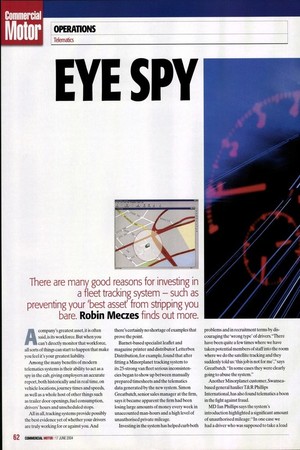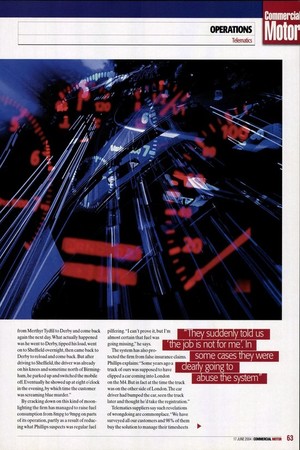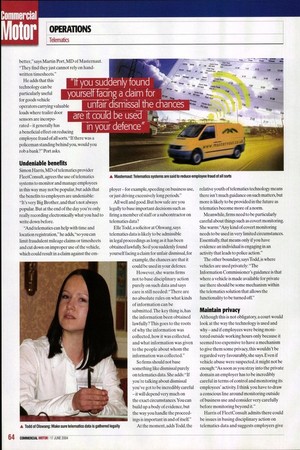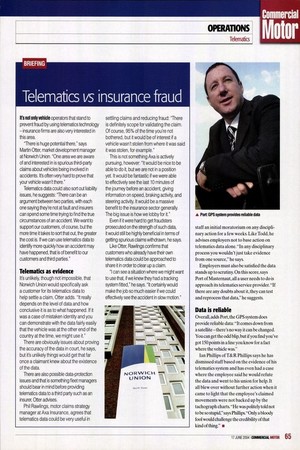EYE SPY There are many good reasons for investing in
Page 60

Page 61

Page 62

Page 63

If you've noticed an error in this article please click here to report it so we can fix it.
a fleet tracking system — such as preventing your 'best asset' from stripping you
bare Robin Meczes finds out more.
Acompany's greatest asset, it is often said, is its workforce. But when you can't directly monitor that workforce, all sorts of things can start to happen that make you feel it's your greatest liability.
Acompany's greatest asset, it is often said, is its workforce. But when you can't directly monitor that workforce, all sorts of things can start to happen that make you feel it's your greatest liability.
Acompany's greatest asset, it is often said, is its workforce. But when you can't directly monitor that workforce, all sorts of things can start to happen that make you feel it's your greatest liability.
Among the many benefits of modern telematics systems is their ability to act as a spy in the cab, giving employers an accurate report, both historically and in real time, on vehicle locations, journey times and speeds, as well as a whole host of other things such as trailer door openings, fuel consumption, drivers' hours and unscheduled stops. All in all, tracking systems provide possibly the best evidence yet of whether your drivers are truly working for or against you. And
there's certainly no shortage of examples that prove the point.
Barnet-based specialist leaflet and magazine printer and distributor Letterbox Distribution, for example, found that after fitting a Minorplanet tracking system to its 25-strong van fleet serious inconsistencies began to show up between manually prepared timesheets and the telematics data generated by the new system. Simon Greatbatch, senior sales manager at the firm, says it became apparent the firm had been losing large amounts of money every week in unaccounted man-hours and a high level of unauthorised private mileage. Investing in the system has helped curb both
problems and in recruitment terms by discouraging the 'wrong type' of drivers."There have been quite a few times where we have taken potential members of staff into the room where we do the satellite tracking and they suddenly told us: 'this job is not for me'," says Greatbatch."In some cases they were clearly going to abuse the system."
Another Minorplanet customer, Swanseabased general haulier T&R Phillips International, has also found telematics a boon in the fight against fraud. MD Ian Phillips says the system's introduction highlighted a significant amount of unauthorised mileage:"In one case we had a driver who was supposed to take a load
from Merthyr Tydfil to Derby and come back again the next day. What actually happened was he went to Derby, tipped his load, went on to Sheffield overnight, then came back to Derby to reload and come back. But after driving to Sheffield, the driver was already on his knees and sometime north of Birmingham, he parked up and switched the mobile off. Eventually he showed up at eight o'clock in the evening, by which time the customer was screaming blue murder." By cracking down on this kind of moonlighting the firm has managed to raise fuel consumption from 8mpg to 9mpg on parts of its operation, partly as a result of reducing what Phillips suspects was regular fuel
pilfering. "I can't prove it, but I'm almost certain that fuel was going missing," he says.
pilfering. "I can't prove it, but I'm almost certain that fuel was going missing," he says.
The system has also protected the firm from false insurance claims. Phillips explains: "Some years ago a truck of ours was supposed to have clipped a car coming into London on the M4. But in fact at the time the truck was on the other side of London.The car driver had bumped the car, seen the truck later and thought he'd take the registration."
The system has also protected the firm from false insurance claims. Phillips explains: "Some years ago a truck of ours was supposed to have clipped a car coming into London on the M4. But in fact at the time the truck was on the other side of London.The car driver had bumped the car, seen the truck later and thought he'd take the registration."
The system has also protected the firm from false insurance claims. Phillips explains: "Some years ago a truck of ours was supposed to have clipped a car coming into London on the M4. But in fact at the time the truck was on the other side of London.The car driver had bumped the car, seen the truck later and thought he'd take the registration."
The system has also protected the firm from false insurance claims. Phillips explains: "Some years ago a truck of ours was supposed to have clipped a car coming into London on the M4. But in fact at the time the truck was on the other side of London.The car driver had bumped the car, seen the truck later and thought he'd take the registration." Telematics suppliers say such revelations of wrongdoing are commonplace. "We have surveyed all our customers and 98% of them buy the solution to manage their timesheets
better," says Martin Port, MD of Masternaut. "They find they just cannot rely on handwritten timesheets." He adds that this technology can be particularly useful for goods vehicle operators carrying valuable loads where trailer door sensors are incorpo He adds that this technology can be particularly useful for goods vehicle operators carrying valuable loads where trailer door sensors are incorpo He adds that this technology can be particularly useful for goods vehicle operators carrying valuable loads where trailer door sensors are incorpo
rated — it generally has a beneficial effect on reducing employee fraud of all sorts. "If there was a policeman standing behind you, would you rob a bank?" Port asks.
rated — it generally has a beneficial effect on reducing employee fraud of all sorts. "If there was a policeman standing behind you, would you rob a bank?" Port asks.
rated — it generally has a beneficial effect on reducing employee fraud of all sorts. "If there was a policeman standing behind you, would you rob a bank?" Port asks. Undeniable benefits
Simon Harris, MD of telematics provider FleetConsult, agrees the use of telematics systems to monitor and manage employees in this way may not be popular, but adds that the benefits to employers are undeniable: "It's very Big Brother, and that's not always popular. But at the end of the day you're only really recording electronically what you had to write down before. "And telematics can help with time and location registration," he adds, "so you can limit fraudulent mileage claims or timesheets and cut down on improper use of the vehicle, which could result in a claim against the em
ployer — for example, speeding on business use, or just driving excessively long periods."
All well and good. But how safe are you legally to base important decisions such as firing a member of staff or a subcontractor on telematics data?
Elle Todd, a solicitor at Olswang, says telematics data is likely to be admissible in legal proceedings as long as it has been obtained lawfully. So if you suddenly found yourself facing a claim for unfair dismissal, for example, the chances are that it could be used in your defence.
Elle Todd, a solicitor at Olswang, says telematics data is likely to be admissible in legal proceedings as long as it has been obtained lawfully. So if you suddenly found yourself facing a claim for unfair dismissal, for example, the chances are that it could be used in your defence.
However, she warns firms not to base disciplinary action purely on such data and says care is still needed: "There are no absolute rules on what kinds of information can be submitted. The key thing is, has the information been obtained lawfully? This goes to the roots of why the information was collected, how it was collected, and what information was given to the people about whom the information was collected."
So firms should not base something like dismissal purely on telematics data. She adds: "If you're talking about dismissal you've got to be incredibly careful — it will depend very much on the exact circumstances.You can build up a body of evidence, but the way you handle the proceedings is important in and of itself." At the moment, adds Todd, the
relative youth of telematics technology means there isn't much guidance on such matters, but more is likely to be provided in the future as telematics become more of a norm.
Meanwhile, firms need to be particularly careful about things such as covert monitoring. She warns: "Any kind of covert monitoring needs to be used in very limited circumstances. Essentially, that means only if you have evidence an individual is engaging in an activity that leads to police action." The other boundary, says Todd, is where vehicles are used privately: "The
Information Commissioner's guidance is that where a vehicle is made available for private use there should be some mechanism within the telematics solution that allows the functionality to be turned off." Maintain privacy
Although this is not obligatory, a court would look at the way the technology is used and why — and if employees were being monitored outside working hours only because it seemed too expensive to have a mechanism to give them some privacy, this wouldn't be regarded very favourably, she says. Even if vehicle abuse were suspected, it might not be enough: "As soon as you stray into the private domain an employer has to be incredibly careful in terms of control and monitoring its employees' activity. I think you have to draw a conscious line around monitoring outside of business use and consider very carefully before monitoring beyond it." Harris of FleetConsult admits there could be issues in basing disciplinary action on telematics data and suggests employers give
staff an initial moratorium on any disciplinary action for a few weeks. Like Todd, he advises employers not to base action on telematics data alone. "In any disciplinary process you wouldn't just take evidence from one source," he says.
Employers must also be satisfied the data stands up to scrutiny. On this score, says Port of Masternaut, all a user needs to do is approach its telematics service provider. "If there are any doubts about it, they can test and reprocess that data," he suggests. Data is reliable
Overall, adds Port, the GPS system does provide reliable data: "It comes down from a satellite — there's no way it can be changed. You can get the odd blip, but if you find you've got 150 points in a line you know for a fact where the vehicle was." Ian Phillips of T&R Phillips says he has dismissed staff based on the evidence of his telematics system and has even had a case where the employee said he would refute the data and went to his union for help. It all blew over without further action when it came to light that the employee's claimed movements were not backed up by the tachograph charts. "He was politely told not to be so stupid," says PhiBips."Only a bloody fool would challenge the credibility of that kind of thing." •




























































































































































































